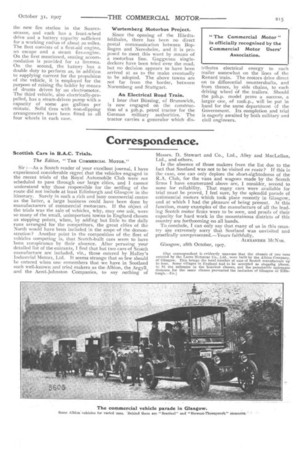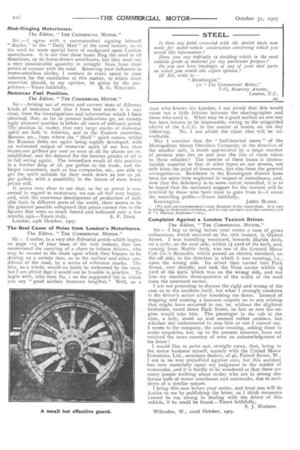Correspondence.
Page 21

Page 22

If you've noticed an error in this article please click here to report it so we can fix it.
Scottish Cars in R.A.C. Trials.
The Editor, "THE COMMERCIAL MOTOR."
Sir :—As a Scotch reader of your excellent journal, I have experienced considerable regret that the vehicles engaged in the recent trials of the Royal Automobile Club were not scheduled to pass through our large cities, and I cannot understand why those responsible for the settling of the route did not include at least Edinburgh and Glasgow in the itinerary. Surely in such a rich and busy commercial centre as the latter, a large business could have been done by manufacturers of commercial motorcars. If the object of the trials was the sale of vehicles, why, rnay one ask, were so many of the small, unimportant towns in England chosen as stopping points, when, by adding but little to the daily runs arranged for the competitors, the great cities of the North would have been included in the scope of the demonstration? Another point in the composition of the fleet of vehicles competing is, that Scotch-built cars seem to have been conspicuous by their absence. After perusing your detailed list of the entrants, I find that but two cars of Scotch manufacture are included, viz., those entered by Halley's Industrial Motors, Ltd. It seems strange that so few should be entered when one remembers that we have in Scotland such well-known and tried makers as the Albion, the Argyll, and the ..Arrol-Johnston Companies, to say nothing of Messrs. D. Stewart and Co., Ltd., Alley and MacLellan, Ltd., and others.
Is the absence of those makers from the list due to the fact that Scotland was not to be visited en route? If this is the case, one can only deplore the short-sightedness of the R.A. Club, for the vans and wagons made by the Scotch firms I have enumerated above are, I consider, second to none for reliability. That many cars were available for trial must be proved, I feel sure, by the splendid parade of commercial motors which took place recently in Glasgow, and at which I had the pleasure of being present. At this function, many examples of the manufacture of all the leading Scotch motor firms were to be seen, and proofs of their capacity for hard work in the mountainous districts of this country are forthcoming on all hands.
To conclude, I can only say that many of us in this country are extremely sorry that Scotland was -unvisited and practically unrepresented—Yours faith f ully,
ALEXANDER MCNAB, Glasgow, 28th October, 1907.
Mud-Hinging Motorbuses.
The Editor, "THE COMMERCIAL MOTOR."
Sir :—I agree with a correspondent signing himself " Zepha,-' in the " Daily Mail " of the 22nd instant, as to the need fol some special form of mudguard upon London motorbuses. It is not that these buses fling the mud in all directions, as do horse-drawn omnibuses, but they send out a very oonsiderable quantity in straight lines from their points of contact with the road. Knowing your influence in motor-omnibus circles, I venture to crave space in your columns for the ventilation of this matter, to which more attention should, in my opinion, be given by the pro.
prietors.—Yours faithfully, R. G. WILLIAms.
Motorcar Fuel Position.
The Editor," THE COMMERCIAL MOTOR."
Sir :—Arising out of recent and current tests of different kinds of motorcar fuel that I have had made, it is very clear, from the investigations and information which I have obtained, that, so far as present indications go, an exceedingly pleasant position is before all users of ordinary petrol. The position is, to-day, that very large stocks of motorcar spirit are held in America, and in the Eastern countries, Borneo, etc., from where the " Shell " spirit comes, whilst the Russian fields are again being rapidly developed, with an estimated output of motorcar spirit of not less than 6o,000,000 gallons per year as soon as all the plants are reestablished, and the demand for the heavier grades of oil is in full swing again. The immediate result of this position is a further drop of id per gallon to the trade, and the larger consumers, such as bus companies, etc., are able to get the spirit suitable for their work down as low as 7d. per gallon, with a possibility in the future of even lower prices still.
It seems very clear to me that, so far as petrol is concerned in regard to motorcars, we can all feel very happy, and, with the enormous development of production of suitable fuels in different parts of the world, there seems to be the greatest possible safeguard that prices cannot rise to the figures that were so much feared and indicated only a few months ago.—Yours truly, S. F. EDGE. London, 24th October, 1907.
The Real Cause of Noise from London's Motorbuses, The Editor, "THE COMMERCIAL MOTOR."
Sir I notice, in a very able Editorial article which begins on page 113 of your issue of the Toth instant, that you recommend the carrying of a chart to inform drivers, who may be unused to the route upon which they happen to be driving on a certain date, as to the surface and other conditions of the road, by a series of reference marks. The idea, as a whole, would no doubt be welcomed by the men, but I am afraid that it would not be feasible in practice. To begin with, take item No. i on the suggested list in which you say " good surface (between lengths)." Well, as a man who knows his London, I am afraid that this would cause not a little friction between the ohartographer and those who used it. What may be a good surface on one day has been known to be impassable, owing to the misguided efforts of the L.C.C. in the matter of trams, on the day
following. No, I am afraid the chart idea will be unworkable.
May I mention that the "half-hearted move " of the Metropolitan Steam Omnibus Company, in the direction of the smaller unit, is much appreciated by a large number of persons who live on and near the line of route taken by these vehicles? The interior of these buses is immeasurably superior to that of other types on our streets, not only from the point of knee-room, but also from the general arrangements. 'Residents in the Kensington district have been for some time neglected in respect of motorbuses, and, now that the deficiency is to some extent remedied, it is to be hoped that the necessary support for the venture will be received by those who have most to gain from it—I mean the travelling public.—Yours faithfully,
Kensington. JAMES BLAIKE.
' LWe note our correspondent's curt dismissal of the route-chart. It is easy to indulge in destructive criticism, and he may not have seen the contrary view of "A Railway Engineer."—End Complaint Against a London Taxicab Driver.
The Editor, "THE COMMERCIAL MOTOR."
Sir :—I beg to bring before your notice a case of gross callousness, which occurred on the 17th instant, in Oxford Street. I was travelling westward, towards Marble Arch, on a cycle, on the near side, within. q yard of the kerb, and, coming from Marble Arch, was one of the General Motor Cab Co.'s Renaults, which passed an electric standard, on the off side, in the direction in which it was running, i.e., upon the wrong side. Its driver then turned into Park Street, very sharply, and took the West corner within yard of the kerb, which was on the wrong side, and ran into my machine three-quarters of the width of the road from the eastward corner.
I am not proposing to discuss the right and wrong of the case as to the accident itself, but what I strongly condemn is the driver's action after knocking me down. Instead of stopping and making a humane enquiry as to any mishap that might have occurred to me, he, without the slightest hesitation, raced down Park Street, as fast as ever his engine would take him. The passenger in the cab at the time, a lady, stood up and seemed rather anxious, but whether she endeavoured to stop him or not I cannot say. I wrote to the company, the same evening, asking them to make enquiries, but, up to the present moment, have not received the mere courtesy of even an acknowledgment of the letter !
I would like to point out, straight away, that, being in the motor business myself, namely with the United Motor Industries, Ltd., accessory dealers, of 46, Poland Street, W., I am in no way prejudiced against cars, but this accident has very materially upset my judgment in the matter of motorcabs, and it is hardly to be wondered at that there are many people walking about to-day who are in strong dig. favour both of motor omnibuses and motorcabs, due to accidents of a similar nature.
I bring this case before your notice, and trust you will do justice to me by publishing the fetter, as I think measures cannot be too strong in dealing with the driver of this. vehicle, if he could be found.—Yours faithfully,
S. J. WATSON. Willesden, W.; 22nd October, 1907.
























